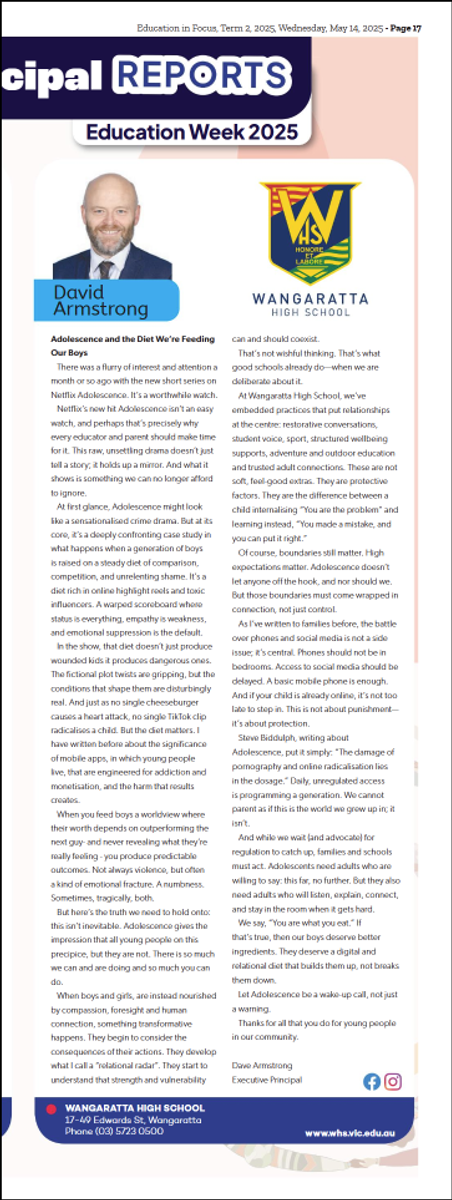From the Principal: GAT on the horizon and further reflections on Adolescence TV series

On Tuesday, 17th June, many of our senior students will sit the General Achievement Test (GAT), and we extend our best wishes to each of them.
The GAT is a key component of the VCE assessment program. It plays an important role in confirming that school-based and external assessments are accurately and fairly aligned. While the GAT does not directly count toward a student’s study score, it is used in several important ways: to check that VCE external assessments and school-based assessments are accurately graded, and to help calculate a student’s Australian Tertiary Admission Rank (ATAR) if necessary.
All students enrolled in one or more VCE or scored VCE VET Unit 3–4 subjects are required to complete both sections of the GAT. Students completing the VCE Vocational Major are required to complete Section A (literacy and numeracy), unless they have already met the relevant standards.
We know our students will approach the GAT with focus and confidence, and we thank the staff who are supporting them in their preparation.
Subsequent reflections on Netflix Adolescence series
In our April newsletter, I shared some of my thoughts on the Netflix Adolescence, which you can access here. I subsequently adapted this article and expanded further when I wrote for the Wangaratta Chronicle and shared some of my reflections in the lessons we can draw for our support of boys and young men. I received some positive feedback from the community, and being mindful that some of you may not have seen I am sharing my Wangaratta Chronicle it here
Adolescence and the Diet We’re Feeding Our Boys
There was a flurry of interest and attention a month or so ago with the new short series on Netflix Adolescence. It’s a worthwhile watch.
Netflix’s new hit Adolescence isn’t an easy watch, and perhaps that’s precisely why every educator and parent should make time for it. This raw, unsettling drama doesn’t just tell a story; it holds up a mirror. And what it shows is something we can no longer afford to ignore.
At first glance, Adolescence might look like a sensationalised crime drama. But at its core, it’s a deeply confronting case study in what happens when a generation of boys is raised on a steady diet of comparison, competition, and unrelenting shame. It’s a diet rich in online highlight reels and toxic influencers. A warped scoreboard where status is everything, empathy is weakness, and emotional suppression is the default.
In the show, that diet doesn’t just produce wounded kids it produces dangerous ones. The fictional plot twists are gripping, but the conditions that shape them are disturbingly real. And just as no single cheeseburger causes a heart attack, no single TikTok clip radicalises a child. But the diet matters. I have written before about the significance of mobile apps, in which young people live, that are engineered for addiction and monetisation, and the harm that results creates.
When you feed boys a worldview where their worth depends on outperforming the next guy- and never revealing what they’re really feeling - you produce predictable outcomes. Not always violence, but often a kind of emotional fracture. A numbness. Sometimes, tragically, both.
But here’s the truth we need to hold onto: this isn’t inevitable. Adolescence gives the impression that all young people on this precipice, but they are not. There is so much we can and are doing and so much you can do.
When boys and girls, are instead nourished by compassion, foresight and human connection, something transformative happens. They begin to consider the consequences of their actions. They develop what I call a “relational radar”. They start to understand that strength and vulnerability can and should coexist.
That’s not wishful thinking. That’s what good schools already do—when we are deliberate about it.
"When boys and girls, are instead nourished by compassion, foresight and human connection, something transformative happens. They begin to consider the consequences of their actions."
At Wangaratta High School, we’ve embedded practices that put relationships at the centre: restorative conversations, student voice, sport, structured wellbeing supports, adventure and outdoor education and trusted adult connections. These are not soft, feel-good extras. They are protective factors. They are the difference between a child internalising “You are the problem” and learning instead, “You made a mistake, and you can put it right.”
Of course, boundaries still matter. High expectations matter. Adolescence doesn’t let anyone off the hook, and nor should we. But those boundaries must come wrapped in connection, not just control.
As I’ve written to families before, the battle over phones and social media is not a side issue; it’s central. Phones should not be in bedrooms. Access to social media should be delayed. A basic mobile phone is enough. And if your child is already online, it’s not too late to step in. This is not about punishment—it’s about protection.
Steve Biddulph, writing about Adolescence, put it simply: “The damage of pornography and online radicalisation lies in the dosage.” Daily, unregulated access is programming a generation. We cannot parent as if this is the world we grew up in; it isn’t.
And while we wait (and advocate) for regulation to catch up, families and schools must act. Adolescents need adults who are willing to say: this far, no further. But they also need adults who will listen, explain, connect, and stay in the room when it gets hard.
We say, “You are what you eat.” If that’s true, then our boys deserve better ingredients. They deserve a digital and relational diet that builds them up, not breaks them down.
Let Adolescence be a wake-up call, not just a warning.
Thanks for all that you do for young people in our community.
Dave Armstrong
Executive Principal

